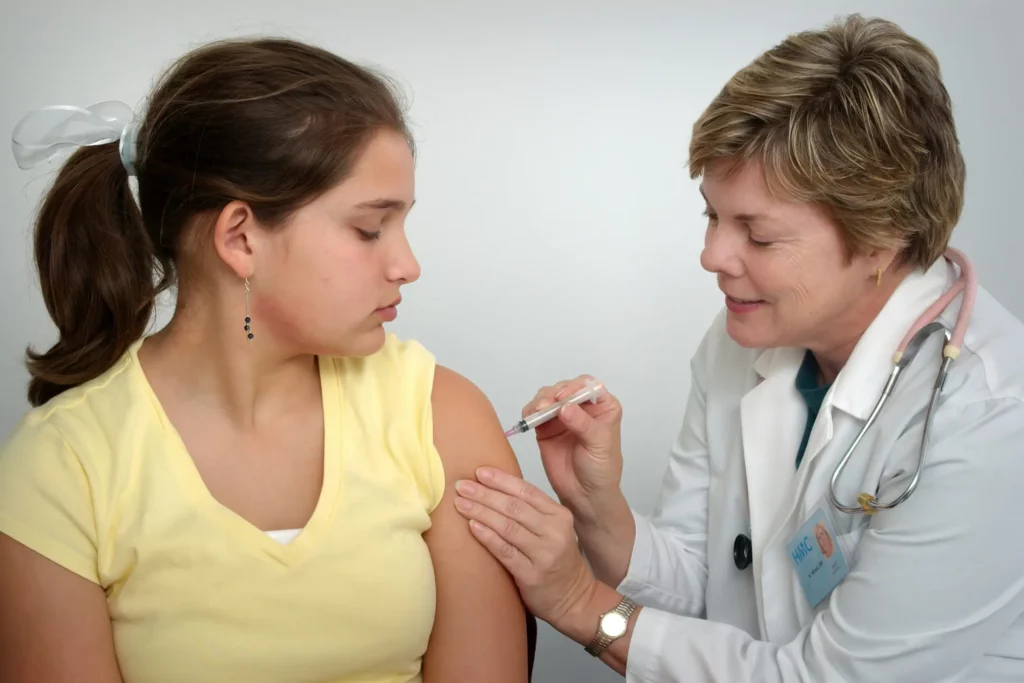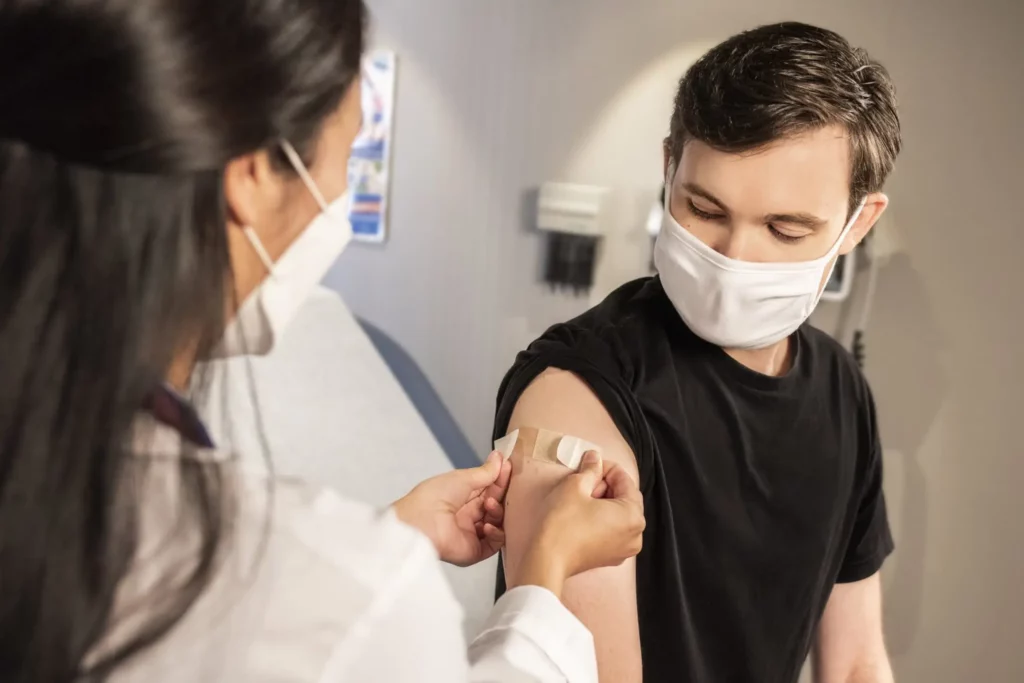Vaccination and Immunisation

Introduction
Vaccination is the process of giving you a type of medicine called a vaccine which protects you against a specific infection.
What is vaccination and immunisation?
Vaccination is the process of giving you a type of medicine called a vaccine which helps
to protect you from being infected by a virus or bacteria.
Once you have been vaccinated, your body develops immunity to that infection (through antibodies) – this means that if you come into contact with that virus or bacteria later, you are unlikely to catch that infection or you may have a less severe illness.
Some vaccinations also need a booster, such as Tetnus vaccines, as the immunity they provide can decrease over time. This means even if you’ve had an injection in the past, your body might need an extra dose later to top up your immunity.
What vaccinations do people get at school?
Most young people get their vaccines at high school. Examples of vaccines you can have at high school include:
- Combination diphtheria-tetanus-pertussis (whooping cough) (dTpa) vaccine –protects against three diseases and requires boosters (recommended every 10 years. Diphtheria is a rare infection which can cause a swelling of tissues in the throat and difficulty breathing. Tetanus is an infection that causes spasming of the muscles and difficulty breathing. Pertussis causes a bad cough, which can be very serious if spread to infants.
- Human papillomavirus (HPV) vaccine – protects against 9 types of HPV. HPV can cause cancer of the cervix, vagina, penis, vulva, anus and throat and genital warts.
- Meningococcal ACWY vaccine protects against four types of meningococcal disease (A, C, W and Y). Meningococcal disease can cause infection of the tissues around the brain (meningitis) or infection of the blood (septicaemia).
What if I missed my vaccinations at school?
Some young people miss out on getting their vaccine at school, for example, if they have been away from school on the vaccination day. If this happens, they might be able to get the vaccine later that year.
NSW Health will write to parents/guardians who give consent for vaccination if catch-up vaccination will be offered at school in the following year or to recommend that they should go to their local doctor to have the vaccine they need. Alternatively, free catch-up vaccines are available at your local general practitioner
(GP), pharmacist immuniser or Aboriginal Medical Services (AMS).
For more information visit the NSW Health website about vaccines given in high school or the NSW Health website about vaccinations for young people aged 17-25.
I’m worried about getting a vaccine or the side effects of a vaccine.
If you’re worried about getting a vaccination, it helps to understand exactly what vaccines you are going to have, what they protect you against, what will happen on the day when you have a vaccine and how you might feel afterwards.
Some things that people can be worried about when receiving vaccination:
- How much the needle hurts.
- How they might react to the needle or the vaccination.
- Side effects of the vaccination.
- What is in the vaccination or how it might impact their health.
- Some people are afraid of needles and very occasionally faint.
If you are worried about any of these issues it is helpful to talk to your doctor or school nurse about your concerns.
The doctor or nurse can give you information on the vaccine, how it works, and if it might impact you in any way and they can help you through the process. You can also have a friend with you when you have the vaccine.
Getting the vaccination in school
You can get ready for the vaccine in school by:
- eating a good breakfast.
- if your school allows it, wearing a short sleeve shirt like your sports uniform.
A nurse will talk to you about the vaccine. There may be other students already there.
Make sure you let the teacher or nurse know if you are feeling nervous or unwell.
The nurse will ask you some questions like:
- your name, date of birth and address
- check that your consent form has been signed
- ask if you are feeling well or have any allergies
- other questions about your health and wellbeing
When getting your vaccine, you may feel a little pinch, sting, or tingle. After you get your vaccine, you will need to wait for 15 minutes to make sure you’re feeling well. It is common to get some swelling, muscle ache, redness, and a small red lump at where you had the injection. You may also feel tired or have a headache. Make sure you keep moving your arm to help with muscle soreness and tell someone if you feel sick. After vaccination you can play sport, have a shower, and participate in after school activities.
Sides effects of vaccines
You may experience minor side effects following vaccination. Most reactions are mild and last no more than a couple of days and you will recover without any problems.
Common side effects include:
- mild pain, redness and swelling at the injection site,
- mild fever,
- mild headache,
- mild aches and pains.
What to do if a local reaction occurs at the injection site:
- put a damp cloth on the injection site to relieve tenderness,
- take paracetamol for pain. Follow the directions on the packaging.
- drink extra fluids.
If you have these side effects, there is no risk, and it does not mean there is a problem with the vaccination.
But if you are concerned that the side effects are getting worse or are unusual, call your doctor to discuss what to do.
Influenza Vaccines
Influenza (flu) is a respiratory infection caused primarily by influenza A and B viruses. It is more serious than the common cold and severe cases can result in breathing difficulties and lung infection. A yearly flu vaccine is recommended for everyone aged 6 months and over. This is not provided as part of the school program but can be booked at the GP, pharmacy, or AMS.

Vaccines for travelling
If you plan on travelling overseas, talk to your GP (doctor) to see what vaccinations or other medications you might need to take with you.
It’s a good idea to visit your doctor at least a month before you plan on travelling.
You can get a copy of your vaccination history from the Australian Immunisation Register (AIR) at any time by:
- Using your Medicare online account through MyGov
- Using the Medicare Express Plus App
- Calling the AIR General Enquiries Line on 1800 653 809.
You should also check if the countries you are visiting require you to have proof of specific vaccinations.
For example, to travel to Colombia, you need to have a Yellow Fever vaccination and a certificate to prove that you had it 30 days before going to the country.
Sometimes a vaccination isn’t needed but other medication might be prescribed to you, such as malaria tablets if you are travelling to some parts of Thailand or Indonesia.
For more information and tips on staying healthy while travelling, visit NSW Health.